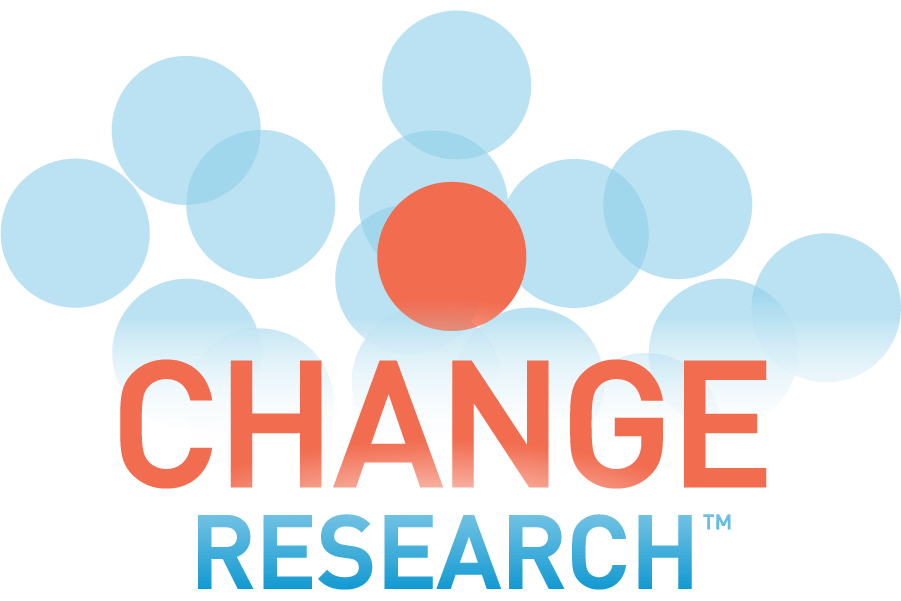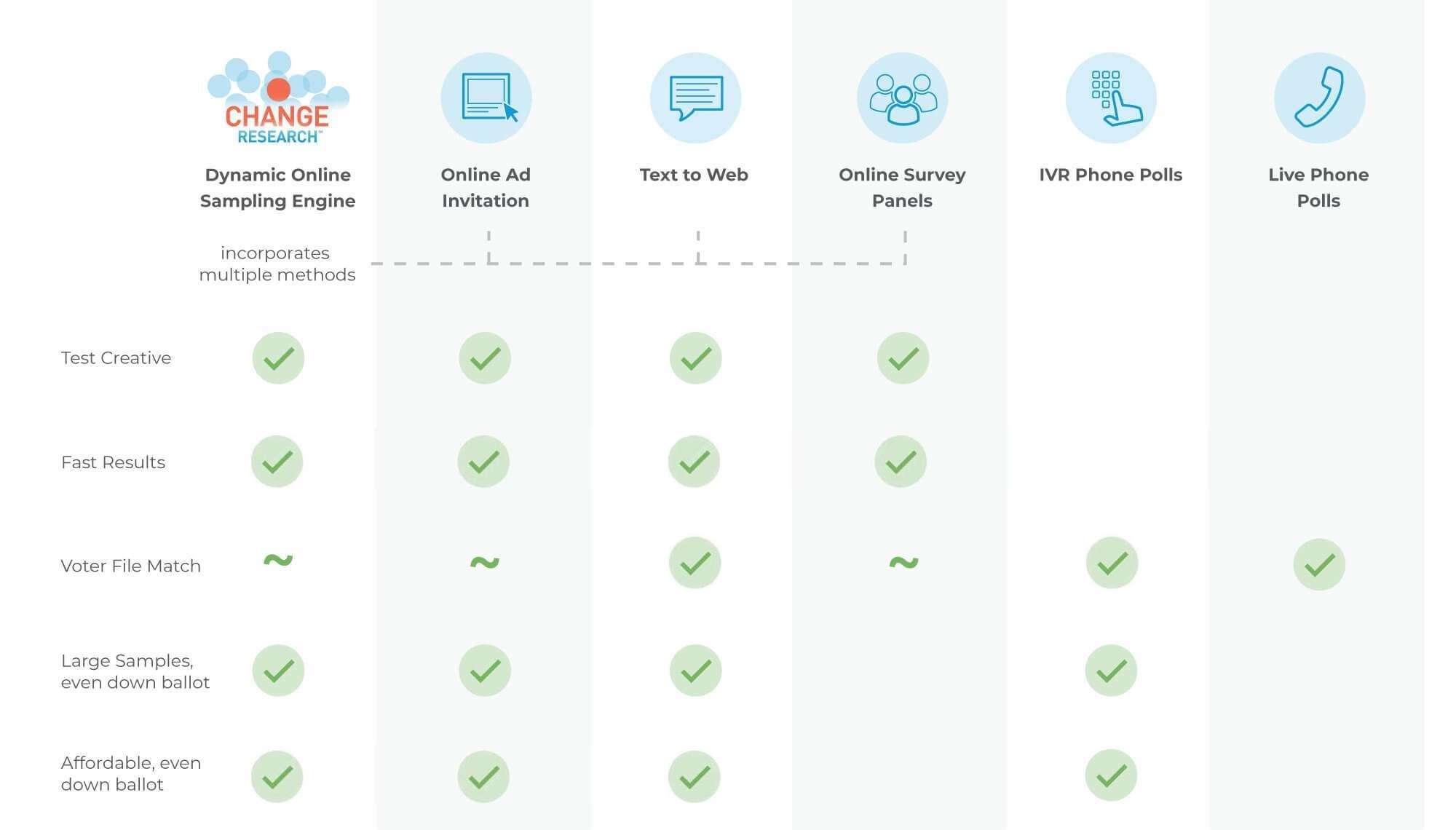
Methodology & Accuracy
2024 Accuracy Report
2022 Accuracy Report
2020 Accuracy Report
The New Gold Standard
MEET PEOPLE WHERE THEY ARE – ONLINE AND ON THE GO
Change Research’s methodology is unique. We recruit respondents through a combination of methods, including digital ads, text messaging, and selective panels, to participate in online polls.
As we are collecting survey responses, Change Research’s Dynamic Online Sampling Engine adjusts our targeting to ensure a sample that accurately reflects the electorate or population, including populations that are traditionally underrepresented in polling.
We recruit fresh participants online for each and every poll, so Change Research polls are not affected by the dwindling response rates of phone polling.
We reach millennials and seniors, rural and urban dwellers, and members of every gender, race, creed, and political persuasion. In 2020, our methodology was more accurate than any other.
Reach a representative, inclusive sample
Change Research’s Dynamic Online Sampling Engine delivers a cross-section of respondents that accurately reflects the electorate or population.
We establish — and can rapidly adjust — advertising and texting targets across age, gender, race, and partisanship to reflect a district’s demographics. Any imbalances or lack of representation in the survey sample can be quickly detected and corrected while the survey is still fielding, rather than relying solely on post-survey techniques for big corrections.


Target the right respondents – FAST
We use our proprietary geo-targeting technology to find respondents in a specific district, be it a city council district, Congressional district, or the entire nation.
We locate respondents rapidly and can deliver results as little as two to three days after a poll launches. For instance, in 2025 we launched surveys in eight Chicago wards simultaneously for One Future Illinois, entering the field within hours of the client’s request. Each survey was tailored to the ward’s specific alderman, issues, and community priorities. We delivered results to the client within three days, providing rapid, actionable insights based on representative samples of 300 in each ward. The polls have drawn significant media attention in Chicago, elevating voter concerns about new economic legislation and the mayor’s proposed budget.
Apply best practices in weighting

Once all the responses are collected, we quickly and accurately conduct post-stratification weighting to ensure that all segments of the electorate are properly weighted in the poll. We also use models based on tens of thousands of historical data points to estimate turnout, instead of relying solely on the patterns of a prior election.
Leverage AI and big data
How does Dynamic Online Sampling compare to other methods?
Polling accuracy is deeply linked to how pollsters reach voters. Good sampling can make the difference between a poll that tells the right story, and one that is fundamentally flawed.
polling methodologies

Change Research
Change Research is fast, accurate, and affordable.
Our proprietary Dynamic Online Sampling engine recruits respondents through a combination of online platforms, including digital ads and select panels, to participate in online polls. We also contact respondents using text messages sent to their phones, but we do not rely on phone calls.
This multi-modal online approach to fielding and sampling balances the strengths and weaknesses of different recruitment methods, allowing us to quickly deliver a cross-section of respondents that accurately reflects the electorate or population of interest. And because we conduct all of our fielding in-house, we save clients money by avoiding the need to contract with other vendors.
ONLINE METHODS
The various online methods Change Research uses in fielding our surveys share several major strengths, allowing us to:
- Affordably field surveys, even with large sample sizes, in a matter of days
- Balance sample demographics as surveys field, avoiding the need for excessive weights
- Test any sort of visual content ranging from images to videos
Online Ad Invitations
Strengths
Reach a representative sample even in many small state legislative districts.
Weaknesses
Due to the targeting methodology, only 20-40% of respondents can be directly matched back to the voter file.
Text to web
Text-to-web polling surveys voters by texting them a link to a survey which they then take online. Polling firms that traditionally fielded live phone polls have increasingly adopted text-to-web polling to supplement their samples.
Strengths
You can survey the exact same person over time, which is beneficial for longitudinal studies.
The percentage of voters who can be directly matched is high because polls are often fielded by texting voters on a voter file.
Text-to-web can be helpful for reaching respondents who are younger and nonwhite.
Weaknesses
Many people still do not click on links sent from an unknown number.
As cell phone carriers and phone developers take active spam measures, these texts may be marked as spam.
Online Survey Panels
Online panels are large universes of people that agree to join a panel of survey respondents, sometimes because the panel offers respondents incentives like money or gift cards. Online panels then invite certain participants to respond to certain surveys depending on their pre-identified demographics or other characteristics.
Strengths
You can survey the exact same person over time, which is beneficial for longitudinal studies.
Enables pollsters to reach respondents who are not willing to participate in a survey without compensation.
Can be helpful for surveying difficult-to-reach populations, including those who are less politically engaged (such as non-voters and infrequent voters).
Weaknesses
Online panels may not have enough participants in small geographies to get a representative sample through this recruitment method alone.
Because respondents are usually compensated, extra care is needed to ensure responses are of high quality.
Limited if any ability to match respondents back to the voter file.
phone polling METHODS
Live Phone Polls
In live phone polls, interviewers call a random sample of landlines and cell phones, usually from a list of voters (the voter file) and ask those who answer survey questions.
Strengths
You can match most survey respondents directly to a voter on the voter file.
Weaknesses
The survey industry has been experiencing declining survey response rates for years, leading to higher costs and questions about reliability.
Polls conducted through live phone polling tend to be expensive, take longer to field, and have a hard time reaching larger sample sizes.
Live phone polling also relies on calling house centers, which are prone to error and often book up during peak campaign season.
Speaking with an individual over the phone may make respondents more likely to answer questions in a “socially desirable” way that does not reflect their true views. This is especially true for culturally sensitive issues like race or abortion.
Interactive Voice Response (IVR) Phone Polls
Interactive Voice Response (IVR) polls are automated calls where respondents give their answers by pressing corresponding numbers on the phone keyboard.
Strengths
IVR polls are typically less expensive and don’t depend on calling house centers.
Like live calling polls, most IVR polls are fielded by calling voters from a voter file, which means you can match respondents directly to a voter file.
Weaknesses
IVR polls have even lower response rates in many cases than live phone polling.
Voice response systems are prone to errors or issues, seem to encourage more false responses, and cannot legally call cell phones. IVR surveys are also illegal in some states.
The survey experience can be dreadful if many candidates and issues are being tested.
Put more simply…

